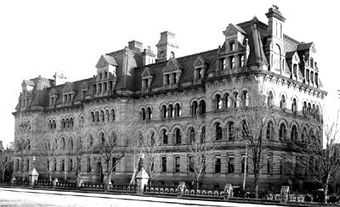Law Reform Commission of Canada
The Law Reform Commission of Canada (1971-1993, 1997 - 2006) began operation as a permanent independent body to study and undertake a systematic review of Canadian LAW. The LRCC recommended improvement, modernization and reform of some federal laws and deletion of others, as well as providing a basis for philosophical inquiry into legal issues.
The LRCC was intended to act as a stable body that would keep federal laws up to date and analyze key public policy issues. The commission established links with government ministries, the judiciary, the legislative assembly, legal academics and others in order to create the knowledge necessary to develop fully considered recommendations for law reform. The benefits of such a commission include independence from government bureaucracy and influence, with access to groups of people who are experts in their areas of interest and focused on the Commissions' issues.
Law Reform Commission of Canada reports resulted in much new legislation and numerous amendments being enacted by Parliament, and its other publications have produced legislative initiatives as well (seeLAW REFORM). The LRCC's work influenced the legal community and provincial commissions, exercising an indirect effect on administrative and legislative reform. The courts refered to positions adopted by the LRCC frequently when making judgements.
The commission programs covered areas such as family law, administrative law, and land expropriation. The two initial projects of the LRCC were to revise the Criminal code and Canada evidence act. These revisions were never completed. The LRCC also worked on reforming electoral laws in Canada.
The LRCC was disbanded in 1993 as part of the federal government's attempts to reduce spending and the federal deficit. In 1996 it was revived by new legislation, enacted in 1997 as the Law Commission of Canada. The Law Commission of Canada was intended to keep federal laws relevant to the changing times. It was created through an act of Parliament entitled the Law Commission of Canada Act. The LCC established partnerships with other agencies, developed research programs, engaged in extensive public consultation, and produced reports to Parliament on recommended law reforms. The commission was permanently disbanded in 2006. Law reform commissions have also existed at various times in the provinces and have worked to reform laws under provincial jurisdiction.

 Share on Facebook
Share on Facebook Share on X
Share on X Share by Email
Share by Email Share on Google Classroom
Share on Google Classroom

